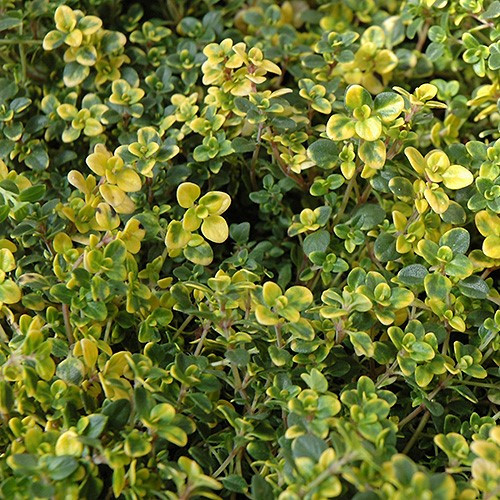| Thymus x citriodorus 'Aureus' | USDA Zone: 4-10 |
This variety brightens the landscape with its yellow-cream variegated foliage; fragrant foliage is ideal for teas with its citrus scent, makes a fine herb for the garden edge; trim out all shoots that revert to green.
Lemon Thyme is a perennial herb that is typically grown for its edible qualities, although it does have ornamental merits as well. The tiny fragrant round green leaves with distinctive gold edges and tinges of creamy white which emerge chartreuse in spring can be harvested at any time in the season. The leaves have a savory taste and a pleasant fragrance. Low growing with a dense, somewhat upright habit. Variegation becomes less prominent during hot weather. Tolerates light foot traffic.
Aside from its primary use as an edible, Aureus Lemon Thyme is sutiable for the following landscape applications;
- Rock/Alpine Gardens
- Border Edging
- General Garden Use
- Groundcover
- Herb Gardens
Bloomtime: Summer
Attracts Butterflies
Variegated Foliage
Other Names: Golden Variegated Lemon Thyme
Common Name: Lemon Thyme, Golden Thyme, Golden Lemon Thyme
|
Key Feature
|
Light Needs | Landscape Uses |
 |
 |
|
|
|
|
| More About Golden Lemon Thyme |
| Height: 6 inches |
Spread: 12-18 inches |
Flower Colour: Pink Shades |
|
Aureus Lemon Thyme is quite ornamental as well as edible, and is as much at home in a landscape or flower garden as it is in a designated herb garden. It should only be grown in full sunlight. It prefers dry to average moisture levels with very well-drained soil, and will often die in standing water. It is considered to be drought-tolerant, and thus makes an ideal choice for a low-water garden or xeriscape application. It is not particular as to soil type or pH. It is highly tolerant of urban pollution and will even thrive in inner city environments. Consider covering it with a thick layer of mulch in winter to protect it in exposed locations Note that when grown in a container, it may not perform exactly as indicated on the tag - this is to be expected. Also note that when growing plants in outdoor containers and baskets, they may require more frequent waterings than they would in the yard or garden. Be aware that in our climate, most plants cannot be expected to survive the winter if left in containers outdoors, and this plant is no exception. NOTE: Some flowers and plants may be harmful or poisonous to people or pets if touched or ingested. If you require more information before placing an order, please let us know in advance. |










